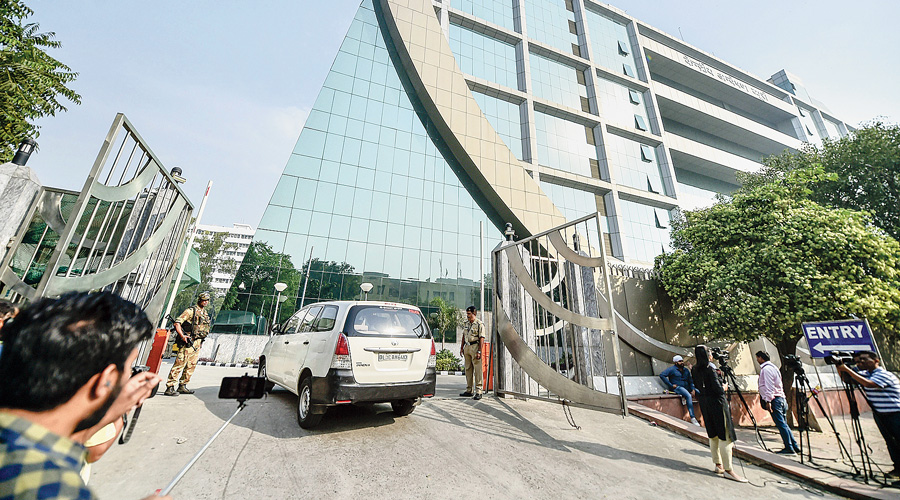The Supreme Court on Tuesday made it clear to the government that it had no choice but to implement the December 2020 order mandating CCTVs at all interrogation cells of investigating agencies.
A bench of Justices R.F. Nariman and B.R. Gavai pointed out that the Centre was dragging its feet on the issue as it rejected solicitor-general Tushar Mehta’s argument that the installation of CCTVs would have “wider ramifications”.
“You will implement it. It is not a question of anything. This is a question of the rights of citizens under Article 21 (life and personal liberty). This has to be implemented and we will ensure it is implemented. There is no choice you have in this. We are giving you three weeks. You file your compliance,” Justice Nariman, heading the bench, told Mehta while adjourning the matter to April 6, by which time the Centre is expected to file a compliance report.
The bench was livid after being informed by amicus curiae and senior advocate Sidharth Dave that most states had expressed difficulty in implementing the December 2 directions citing lack of budgetary resources. When Mehta sought adjournment on Tuesday by citing a letter circulated among officials that the government wanted to examine the issue further, the bench was upset.
The December 2 directions were passed by the apex court after taking suo motu cognisance of rising instances of custodial deaths.
Mehta said he wanted a further adjournment as the Centre had certain reservations as the installation of CCTVs in interrogation cells and premises of central agencies would have “wider ramifications”. He, however, did not elaborate.
Justice Nariman pointed out that at the last hearing on January 27 also the Centre had obtained a three-week adjournment. “You have done nothing. You have not filed an affidavit. So you are dragging your feet on this,” he said.
Mehta replied: “We are setting up an oversight committee….”
But the argument did not cut ice with the bench, which remarked: “Forget oversight committee and all that. You are directed under our order of December 2 in Para 19 specifically to install CCTV cameras…. For your benefit we will read it out.”
The court had directed in paragraph 19: “The Union of India is also to file an affidavit in which it will update this Court on the constitution and workings of the Central Oversight Body (COB), giving full particulars thereof. In addition, the Union of India is also directed to install CCTV cameras and recording equipment in the offices of: (i) Central Bureau of Investigation (CBI) (ii) National Investigation Agency (NIA) (iii) Enforcement Directorate (ED) (iv) Narcotics Control Bureau (NCB) (v) Department of Revenue Intelligence (DRI) (vi) Serious Fraud Investigation Office (SFIO) (vii) Any other agency which carries out interrogations and has the power of arrest. As most of these agencies carry out interrogation in their office(s), CCTVs shall be compulsorily installed in all offices where such interrogation and holding of accused takes place in the same manner as it would in a police station. The COB shall perform the same function… for the offices of investigative/enforcement agencies mentioned above both in Delhi and outside Delhi wherever they be located.”
After reading out the relevant paragraph, Justice Nariman observed: “You have done nothing absolutely and then you are saying ‘wider ramifications’. We want to know what have you really done? What ramifications? We are not concerned about the ramifications.”
Mehta said: “We will file an affidavit. We will take steps to implement…” The bench cut short the argument, saying: “Our orders will be complied with….”
The bench also took to task the states for expressing their inability to immediately comply with the judgment due to budgetary constraints. “We are not concerned with your budgetary allocations. We direct you to make the budgetary allocations,” the court said.
Referring to Haryana, the court said: “You will make budgetary allocations within one month. And within three months after that allocation you will install the CCTVS and comply with the directions.”
The bench, however, exempted the poll-bound states of Bengal, Assam, Kerala and Tamil Nadu and the Union Territory of Puducherry from complying with the directions in the next three-four months.











